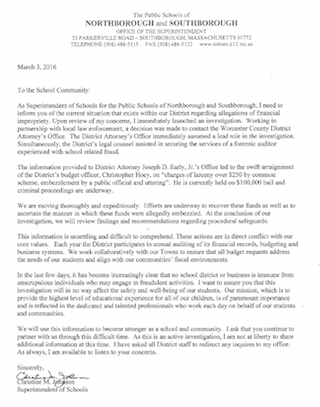How extra words undermine trust: a case study

Fear makes people hide their meaning with extra words. It backfires. We know you’re afraid. Adding words make people less likely to trust you.
A friend forwarded me an excellent example: a 414-word missive about financial improprieties in the school district of Northborough/Southborough, Massachusetts. I know how this letter must have developed: a panicked set of people at the school district kept adding words, sentences, and paragraphs to try to make things better. But every single extra word communicates defensiveness; the total impression is obfuscation.
Read and learn: when you have bad news, write briefly and avoid passive voice, defensive words, and other locutions that don’t ring true. I’ve dissected this letter by highlighting needless words in bold italic and providing commentary and a translation after each paragraph.
March 3, 2016. To the School Community:
 As Superintendent of Schools for the Public Schools of Northborough and Southborough, I need to inform you of the current situation that exists within our District regarding allegations of financial impropriety. Upon review of my concerns, I immediately launched an investigation. Working in partnership with local law enforcement, a decision was made to contact the Worcester County District Attorney’s Office. The District Attorney’s Office immediately assumed a lead role in the investigation. Simultaneously, the District’s legal counsel assisted in securing the services of a forensic auditor experienced with school related fraud. [The meaning ratio of this paragraph is a pathetic 36%. It’s doomed from the start, with the impenetrable mumblespeak of “I need to inform you,” “a lead role,” “working in partnership,” and the passive “a decision was made.” And you don’t to tell us that you’re the superintendent, it’s on the letterhead at the top of the letter. Parents care what’s happening, not how you discovered it. Johnson gets a few extra points for using “I” and speaking directly to the reader. ]
As Superintendent of Schools for the Public Schools of Northborough and Southborough, I need to inform you of the current situation that exists within our District regarding allegations of financial impropriety. Upon review of my concerns, I immediately launched an investigation. Working in partnership with local law enforcement, a decision was made to contact the Worcester County District Attorney’s Office. The District Attorney’s Office immediately assumed a lead role in the investigation. Simultaneously, the District’s legal counsel assisted in securing the services of a forensic auditor experienced with school related fraud. [The meaning ratio of this paragraph is a pathetic 36%. It’s doomed from the start, with the impenetrable mumblespeak of “I need to inform you,” “a lead role,” “working in partnership,” and the passive “a decision was made.” And you don’t to tell us that you’re the superintendent, it’s on the letterhead at the top of the letter. Parents care what’s happening, not how you discovered it. Johnson gets a few extra points for using “I” and speaking directly to the reader. ]
Translation: We discovered alleged financial improprieties in the school district. The Worcester County district attorney is investigating, with the help of a forensic auditor.
The information provided to District Attorney Joseph D. Early, Jr.’s Office led to the swift arraignment of the District’s budget officer, Christopher Hoey, on “charges of larceny over $250 by common scheme, embezzlement by a public official and uttering”. He is currently held on $100,000 bail and criminal proceedings are underway. [When you find out school’s budget officer is under arrest, the amount of the bail is not the first thing you want to know. Nor is the exact charge (“uttering”?).]
Translation: District Attorney Joseph D. Early, Jr. arraigned our budget officer, Christopher Hoey, on embezzlement charges and is now prosecuting him.
We are moving thoroughly and expeditiously. Efforts are underway to recover these funds as well as to ascertain the manner in which these funds were allegedly embezzled. At the conclusion of our investigation, we will review findings and recommendations regarding procedural safeguards. [This paragraph tries to use big words to communicate that the district is doing something important. The passive “were allegedly embezzled” hides the actor, who is (allegedly) Mr. Hoey. Words like “expeditiously” and “immediately” try to create the impression of speed, but the language bogs down the reader and creates the opposite impression.]
Translation: We’ve started investigating who allegedly took the money, how they did it, and whether we can get it back. Then we’ll fix the problem for the future.
This information is unsettling and difficult to comprehend. These actions are in direct conflict with our core values. Each year the District participates in annual auditing of its financial records, budgeting and business systems. We work collaboratively with our Towns to ensure that all budget requests address the needs of our students and align with our communities’ fiscal environments. [This paragraph has hardly any meaning whatsoever. I don’t think anyone feels that embezzlement is one of the core values of the school district, or thinks the school district isn’t working with the towns that it serves.]
Translation: We work with the towns on budgets and audit our records every year.
In the last few days, it has become increasingly clear that no school district or business is immune from unscrupulous individuals who may engage in fraudulent activities. I want to assure you that this investigation will in no way affect the safety and well-being of our students. Our mission, which is to provide the highest level of educational experience for all of our children, is of paramount importance and is reflected in the dedicated and talented professionals who work each day on behalf of our students and communities. [Self-serving bullshit.]
Translation: We try to do a good job.
We will use this information to become stronger as a school and community. I ask that you continue to partner with us through this difficult time. As this is an active investigation, I am not at liberty to share additional information at this time. I have asked all District staff to redirect any inquires to my office. As always, I am available to listen to your concerns. [More platitudes.]
Translation: Call me if you have concerns, and I won’t tell you anything.
Sincerely, Christine M. Johnson, Superintendent of Schools
What this letter should have said
Extra words create trust suspicion, not trust.
Faced with a steaming pile of words like this, step back. Figure out what you’re saying. And say it. Here’s the letter that the superintendent could have sent, with enough directness to begin to rebuild the trust with parents and including the one thing the original letter lacked: an apology.
Dear Parents, Students, and Citizens
We have detected what appear to be financial improprieties at the school district. I’ve referred the matter to the office of the Worcester County District Attorney, Joseph D. Early, Jr. DA Early’s office has arraigned our budget officer, Christopher Hoey, on embezzlement charges.
With the help of a forensic auditor, we’re acting quickly to figure out what happened and whether we can get back any missing funds.
We conduct an annual audit to prevent this sort of thing from happening. As the investigation continues, we are looking for procedural safeguards to prevent future problems like this.
I apologize for this; I’d rather spend my time on keeping your students safe and learning.
I will answer any questions that you have, but keep in mind that I can’t speak to details of an ongoing investigation.
Sincerely, Christine M. Johnson, Superintendent of Schools
That’s 147 words, one-third the length of the original message. Remember, when you have bad news to share, shorter is better.
I find your examinations of language to be valuable and I appreciate your discussion of a topic that many reject — that people all around us hide behind weasel words.
I’m wondering whether you would shorten your paragraphs — to go along with the goal of shortening sentences — by separating your commentary from the content you discuss. The format you’re using is hard to read.
Loving your blog, Sir.
When your writing’s concise, even long seems short. http://bit.ly/1p4IN9b
Spot on, as usual. Extra words mean you’re hiding something and/or you don’t really know what you’re talking about.